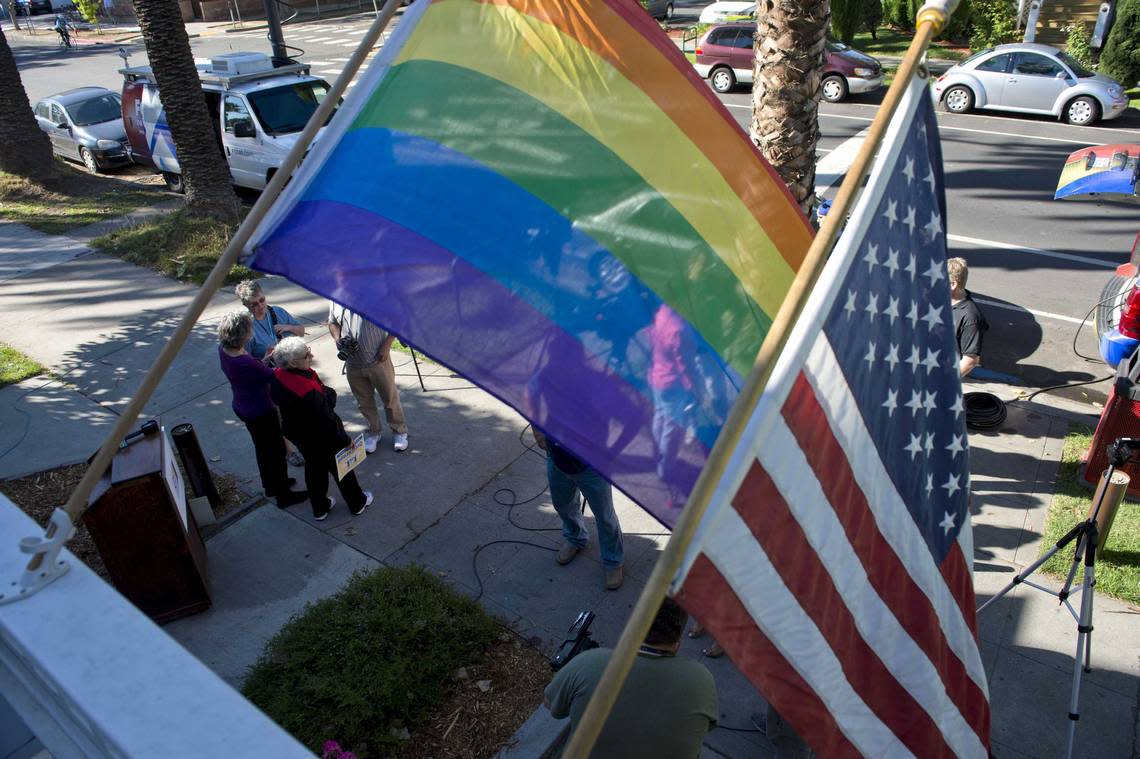These Sacramento nonprofits offer mental health, suicide prevention services for LGBTQ+ youth

At home, Shalimar Boulous worried about backlash against their identity constantly. Boulous is genderqueer, uses they/them pronouns and came out in their late 20s.
When navigating their identity, they faced intense episodes of depression and anxiety and struggled with gender dysphoria.
But through finding a community of other lesbian, gay, bisexual, transgender and queer people, Boulous learned to accept themselves — that they were enough, even in their lowest moments.
“Having other people who were there to support me through those moments, where the person won’t leave me just because I was dealing with (depression and anxiety),” Boulous said. “They see me for me, and that helped me.”
Boulous now serves as a licensed clinical social worker at the Sacramento LGBT Community Center, working with LGBTQ+ youth who face similar obstacles.
The Trevor Project, an LGBTQ+ nonprofit focused on mental health and suicide prevention, estimates more than 1.8 million LGBTQ+ young people consider suicide each year, and that one LGBTQ+ youth in the United States attempts suicide every 45 seconds.
With mental health issues and suicide on the rise among LGBTQ+ youth, here are Sacramento-based nonprofits that offer counseling services and other emergency resources for youth.
Resources in Sacramento
The LGBT Community Center, 1015 20th St. in midtown, offers counseling services Monday through Friday. Appointments are available in English and Spanish. The center provides several community support and addiction recovery groups as well.
The center also provides emergency housing for LGBTQ+ young adults ages 18 to 24. This program can provide housing to homeless youth, from a short-term basis of 90 days to a longer term of two years.
“Unfortunately, many (LGBTQ+ youth) are unhoused because they have been kicked out by their family because of their gender identity or sexual orientation,” said Jaime Gerigk, the center’s chief program officer.
The LGBT Community Center also has the Q-Spot, a youth respite center for young LGBTQ+ people ages 14 to 24. The Q-Spot offers a safe and affirming space for youth to receive food, clothing, showers and a place to relax. Youth can also receive confidential health services and testing for sexually transmitted diseases and HIV.
The Gender Health Center, 3823 V St. in Sacramento’s Elmhurst neighborhood, offers youth counseling services for ages 12 and up. Counseling is free and can be done with or without parental consent. The program is administered by 14 interns who are master’s-level college students and trained on gender-affirming care. These interns are overseen by Sara Seberger, the center’s director of mental health.
The Gender Health Center also provides letter assessments for youth looking for gender transition surgery, like hormone blockers or hormone replacement therapy. To receive transitional care, an individual must have a letter of support from a clinician, Seberger said.
Seberger also recommends youth use the Trans Lifeline, which connects transgender people to resources and services. The Trans Lifeline can be reached at 877-565-8860. The Trevor Project also operates a hotline for LGBTQ+ youth, which can be contacted at 1-866-488-7386.
Why are LGBTQ+ youth continuing to struggle?
In 2020, youth across America were experiencing a mental health crisis. Symptoms of anxiety and depression in adolescents doubled, according to the National Library of Medicine. While rates of mental health issues are beginning to decline, LGBTQ+ youth are still struggling, a report from Axios showed.
LGBTQ+ youth are at a higher risk of suicide because of continuous societal stigma. The Trevor Project found that 37% gay and lesbian youth have seriously considered suicide, while 19% have attempted suicide. For straight youth, these rates are much lower, with 14% considering suicide and 6% attempting it.
Increasing rates of mental health issues and suicidal tendencies for LGBTQ+ youth is reflective of today’s political climate, said Ariela Cuellar, senior communications specialist at the California LGBTQ Health and Human Services Network. For example, there are more than 600 bills in the United States classified as anti-transgender according to the Trans Legislation Tracker, an independent research group.
All of these factors contribute to LGBTQ+ youth feeling unworthy and like they “are not meant to live in this world,” Cuellar said.
“It’s external factors and how we’re mistreated and stigmatized in society by our peers, by the healthcare system, even folks in our own community,” Cuellar said.
For example, nonbinary and transgender youth often face gender dysphoria when having to meet the gender standards of their gender at birth. It’s not only a matter of fitting in, but about safety and security.
“There’s this pressure by family, by society, by peers to show up in accordance with the gender role that matches the gender you’re assigned to at birth,” Seberger said. “But if that’s something that doesn’t feel right to you, and you don’t have the words of support or knowledge that there are other options, it feels really isolating.”
“It’s always like feeling out these situations and always been on high alert (for LGBTQ+ youth),” she continued. “To make sure that your identity and showing up is safe. That is a lot of stress to put on a kiddo.”
Mental health resources and suicide prevention exist beyond the form of counseling, several community center leaders said. Programs that combat other factors that contribute to mental illness, like being unhoused, food insecurity or struggling with addiction, are also considered suicide prevention.
“Suicide can be prevented by creating more resources like these in Sacramento,” Cuellar said.
The 988 Suicide and Crisis Lifeline offers free, anonymous help to anyone in crisis and their loved ones. Access the 24-hour hotline by calling or texting 988. A live chat is available at 988lifeline.org. WellSpace Health, which operates the universal service in the capital region, can also be reached at 916-368-3111 or by texting HOPE to 916-668-4226.

